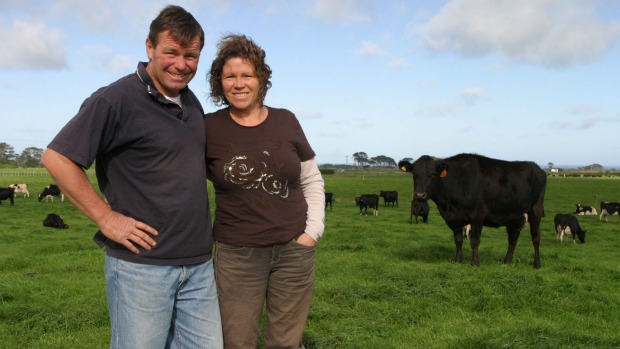
Source: Stuff
Fonterra’s organic farmers are set to cash in on potentially higher prices for their milk amid a “dramatic rise in interest and commitment to organics”, according to an industry rival.
The dairy co-operative has announced that from June its organic suppliers will be paid by one of two different systems: through an independent organic milk price linked to market returns, or – for possibly only the next two years – the current top-up system.
At present they receive the Fonterra price that all other farmers receive plus a bonus premium.
In the case of this season, that equates to $1.75 added to the farmgate forecast of $4.15 for a total of $5.90 per kilogram of milksolids.
It will be up to farmers to choose which payment system they want.
Fonterra’s global business manager for organics, Craig Deadman, said the price would be announced in late April-early May, at the same time as the farmgate price for conventional milk was announced.
He said there was increasing demand for organics and prices were higher and more stable than for conventional milk.
Per tonne, organic milk powder sells on the international market for more than NZ$14,000. By comparison, conventional milk powder prices languish at NZ$2900.
Fonterra launched a new organic policy last March and offered incentives for farmers to convert to organic systems, reversing a 2011 decision to concentrate its organics business in the Waikato.
Since then, it had achieved above its target for growth, although Deadman would not say what that was.
The company was hoping to process an extra 600,000 kg/MS during the next year.
The new payment system had come at farmers’ requests.
Fonterra’s decision to introduce a separate organic milk price is likely to prompt more Taranaki farmers to convert to organic farming, says one organic dairying champion.
Janet Fleming, a member of the new Fonterra Organic Farmers Advisory Group which provides feedback to the co-operative, has received lots of inquiries in the last three months from farmers considering adopting organic farming.
“This decision means the top level of Fonterra is recognising the importance of organics to the co-operative,” she said. “Organic milk creates profit for the whole co-operative, not just for organic farmers. The whole co-operative benefits.”
Organic farmers had been seeking a separate milk price for some time and she said it could be as much as double the price paid for conventional milksolids.
Fleming said Taranaki was one of the fastest growing regions for organic farming. About 15 Taranaki organic farmers supplied Fonterra and another five were converting their farms. Organic milk was collected daily in Taranaki and transported to the Waikato for processing.
Fleming said products to assist organic farmers were more readily available now than when she and husband Stephen started the conversion process in 2004, before there was an organic milk premium.
The couple milk 540 cross-bred cows on their two organic dairy farms comprising 184 effective hectares in the Pihama-Oeo area. They turned to organics because they wanted to be proud of the milk they produced and because it brought benefits to the environment, to their own health and to the health of their herd.
“Supplements are harder to get because we can’t use PKE, proliq or urea. But there are good options available for fertiliser. We still use fertiliser,” she said.
The chairman of the rival Organic Dairy Hub Co-operative of New Zealand, Bill Quinn, congratulated Fonterra on the move.
He said it would not take suppliers away from the hub because it was giving them a per kg price in the “mid-$7 mark” and critically that was paid in full the month following production.
“In the event Fonterra gets markets we haven’t got access to and end up paying a higher value, that’s good competitive growth,” Quinn said.
The hub is the principal supplier of organics to Lewis Rd Creamery. Its farmers are throughout the North Island and it does not operate any plant itself but uses contractors.
While Lewis Rd does not manufacture milk powder, the hub was in negotiations with a number of powder processors for the international market.
There had been a “dramatic” rise in interest from farmers.
“The hub has projections of in excess of 3 million kg of milksolids export grade product over the next three years, and we have in excess of 1 million kg of MS currently lodging paperwork with certificating agencies which also want to supply the hub,” Quinn said.
He said many of New Zealand’s farmers operated as system 1 or 2, which with minimal change could become organic.
To achieve full international market access, it usually takes three years to convert from conventional, but if farmers have not used palm kernel or urea, or other prohibited practices they can make the switch sooner.
Different markets also had different entry requirements for organic products “so we can target milk to processors that meets their requirements”.
Deadman said by linking the organic milk price to organic market returns, more farmers would become organic.
Fonterra had undertaken a series of measures recently to enhance the attractiveness of organic farming for current and prospective organic farmers.
“A recent initiative is the establishment of the Organic Farmers Advisory Group, a representative group of organic farmers who provide an additional feedback channel between organic farmers and Fonterra. They also had provided feedback on the new organic pricing system,” Deadman said.



